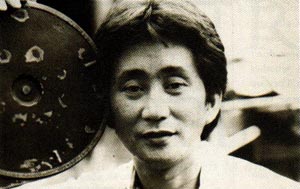|
|
In
Memoriam: Ishmael Bernal
Ishmael Bernal was a fine example of an activist artist dedicated to the
creation of art for the people—an art that depicts the sufferings and the
dreams of the people and moves them to act toward the building of a society
where freedom and justice truly reign.
By
Alexander Martin Remollino
Bulatlat.com
 Movie
director Ishmael Bernal, whose death seven years ago was marked June 2, belonged
to that remarkable breed of filmmakers who brought socially-committed films to
the fore during the dark years of martial law. He went to direct similar films
until he died. Movie
director Ishmael Bernal, whose death seven years ago was marked June 2, belonged
to that remarkable breed of filmmakers who brought socially-committed films to
the fore during the dark years of martial law. He went to direct similar films
until he died.
Bernal’s life was characterized by a richness of experience that infused his
work with a profound awareness of social realities.
He
was born and raised in a very poor neighborhood in Sta. Mesa, Manila. It was
definitely not an inert neighborhood as he often saw street brawls and had his
own share of involvement in these.
As a child he loved both reading and the movies. He read widely and was a
regular habitué of the neighborhood theaters.
He
took his pre-university education at the neighborhood public schools, and thus
was in constant touch with other young people from poor families like himself.
This would be an essential ingredient later in his incisive depiction of the
plight of the poor in his films.
While
taking up English literature at the University of the Philippines (UP), he was
involved in both theater and activism. Aside from having been friends with such
names as Jose Maria Sison, who would later become a prominent revolutionary
leader, he was active in the Student Cultural Association of the University of
the Philippines, a study circle that dealt with socio-political issues. A few
years after graduation from college, he would return to UP and become involved
in Kabataang Makabayan (Patriotic Youth). In later years he became a stalwart of
Free the Artist movement and the Concerned Artists of the Philippines.
As
a young man, he saw much of the night life in Manila - spending the nights on
the streets. He managed a number of coffee shops and owned one himself. These
experiences heightened his insight into the decadence of life in Manila and
society in general.
His love for literature translated into a constant care for the aesthetic
quality of scriptwriting and the substance of the entire work of filmmaking. His
life among the poor and his involvement in activism infused his work with a
fierce commitment to the making of art that serves to awaken the public and move
them to act toward their liberation.
Bernal the filmmaker
Bernal’s
film career was characterized by a highly successful combination of form and
content. He was as passionate about the techniques of scriptwriting and camera
movement as he was about the use of his art to impart scathing social
commentary.
As is usual in the film industry, Bernal started out with commercially-oriented
films before he could venture into cause-oriented cinema. In fact, even when he
was already identified with socially-committed film, he did a
commercially-oriented film every now and then.
But he took care not to make films that ran counter to his basic principles.
Thus, even as he occasionally made commercially-oriented films, he made sure
they were not films that reinforced the societal values he abhorred.
Socially committed films—the likes of his classics “Nunal sa Tubig,”
“Manila After Dark,” “Himala,” and “Wating” — made the bulk of his
work. The ruling classes’ employment of deceit to make the people accept
social injustice, the hypocritical values that prevail in society, unequal
gender relations—these were the themes he frequently dealt with. He is best
known for the 1980 film “Manila by Night,” a film that depicts the decadence
of the night life in Manila.
In the 1990s, he got disillusioned with the trend of degeneration in the film
industry which started in the late 1980s—a reversal of what he and his
contemporaries Lino Brocka, Behn Cervantes, and Mike de Leon had achieved in the
1970s. After making his last film, “Wating,” an action movie which is at the
same time an attack on the religious establishment, he decided to quit
filmmaking. He turned to theater and directed plays for the militant mass
movement while occasionally making television commercials.
Passing
Death was the farthest thing from his mind when Bernal passed away. In fact he
was rethinking his decision to retire from the film industry, and in his last
interview seemed excited about his new plans. He was even joking about making
“The Great Filipino Film”—something he was undoubtedly capable of doing.
But death came for him four days after that interview.
Bernal, however, lives on. He continues to be an inspiration to his fellow gays,
to his fellow artists, and to his fellow activists.
And rightly so, for he was a fine example of an activist artist dedicated to the
creation of art for the people—an art that depicts the sufferings and the
dreams of the people and moves them to act toward the building of a society
where freedom and justice truly reign. Bulatlat.com
Back
to top
We
want to know what you think of this article.
|

